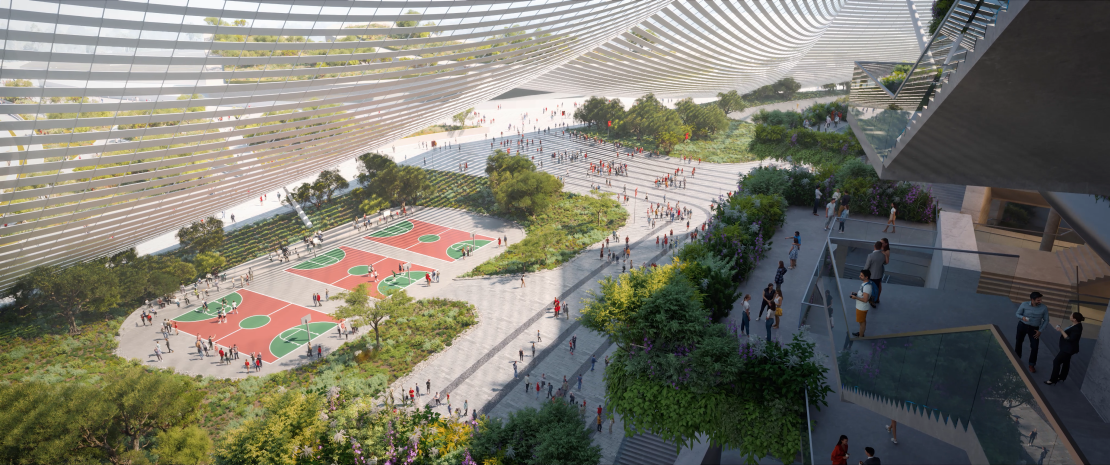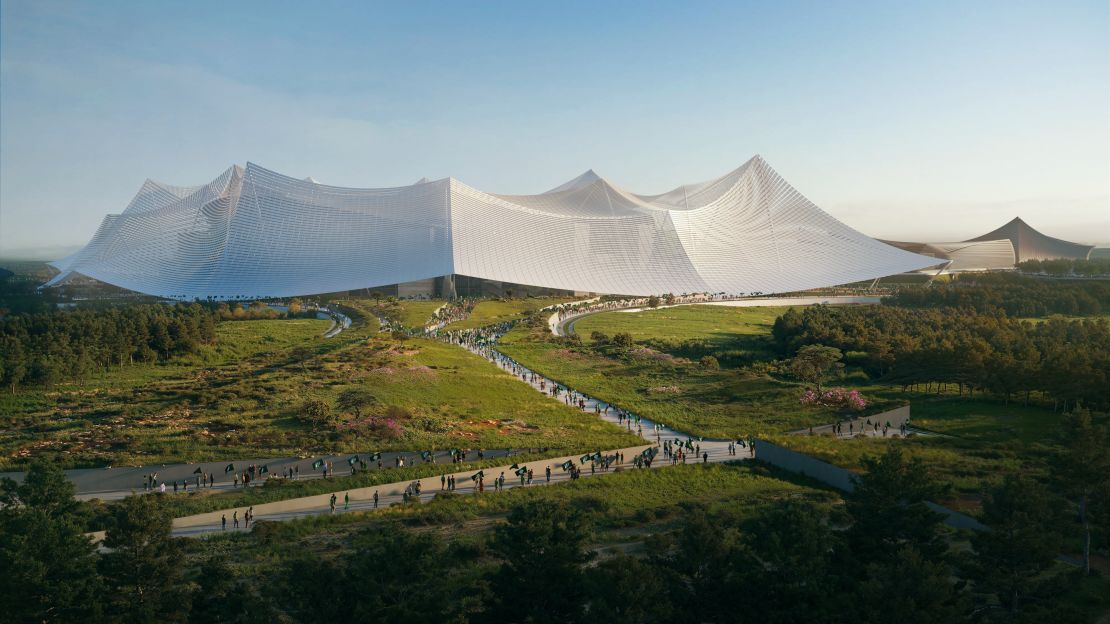The final of the 2030 FIFA World Cup is five years and 11 months away, and the design for the stadium which hopes to host the match has finally been revealed.
The Grand Stade Hassan II soccer stadium in Morocco – one of three countries co-hosting the tournament alongside Spain and Portugal – is being touted as potentially “the largest football stadium in the world” by designers Oualolou + Choi and Populous, with a planned capacity of 115,000.
The stadium will be situated on a 100-hectare (roughly 247 acres) site in El Mansouria, a town north of Casablanca, with a design Populous says recalls a “moussem,” a type of traditional communal tent. The Grande Stade’s take will be made from an aluminum lattice, which will cover both fans inside the stadium and tiered gardens on the outside of the stands, and a botanical garden on the ground floor.

The design, according to Tarik Oualalou, design principal and founding partner at Oualalou + Choi, “is deeply rooted in Moroccan culture, with its traditions and contemporary expressions,” he wrote in a press release. “It is rooted in ancient and primordial figures: the Moussem, the tent, and the garden, as well as the topography and landscapes of Morocco.”
The configuration appears tailored for FIFA World Cup events: the stands themselves will be separated into zones for general admission fans at each end (holding nearly 30,000 each), while the main section will be dedicated to boxes, hospitality, VIPs and VVIPs, according to the release.
“(It) will be a truly iconic, landmark venue for Morocco and for football itself, that will become one of the great stadia of the world,” said Christopher Lee, managing director at Populous, EMEA.

So how would the Grand Stade Hassan II stack up against other ludicrously capacious stadia?
Cricket can lay claim to having the largest stadium of all, the Narendra Modi Stadium in Ahmedabad, India, which expanded to its massive 132,000 capacity in 2021, while the largest American football stadium belongs to the NCAA’s Michigan Wolverines, which hosts over 107,000 fans.
The world’s biggest soccer stadium is a multi-purpose venue and among the world’s most inaccessible: the Rungrado 1st of May Stadium in Pyongyang, North Korea. Opened in 1989, its official capacity is 150,000, although renovations in the 2010s spurred an investigation from website Stadium Database, which estimated the venue now seats a mere 114,000 fans.
Is it a coincidence the Grande Stade Hassan II will have 1,000 more seats? Perhaps not.
Populous is no stranger to building large sporting structures: it was behind the Tottenham Hotspur Stadium and Emirates Stadium in London, a dozen Olympic venues and other stadia around the world.

After five unsuccessful bids to host the FIFA World Cup, Morocco finally got its foot through the door when FIFA announced in October 2023 that the nation would co-host the 2030 finals alongside Spain and Portugal, in an unusual, elongated tournament setup that will also see one commemorative game played in Uruguay, Argentina and Paraguay each to mark the FIFA World Cup’s centenary.
The Grande Stade Hassan II’s design team say the stadium will be “fully compliant for FIFA competitions” and will have “the ability to host the final” of the 2030 World Cup; the final decision on which location FIFA will choose is still pending, though Real Madrid’s newly renovated Estadio Santiago Bernabéu is widely expected to be the favorite.
Preparations for groundworks at the site outside Casablanca have begun, say Oualolou + Choi and Populous, so expect to see this grand design brought to life in the coming years.










